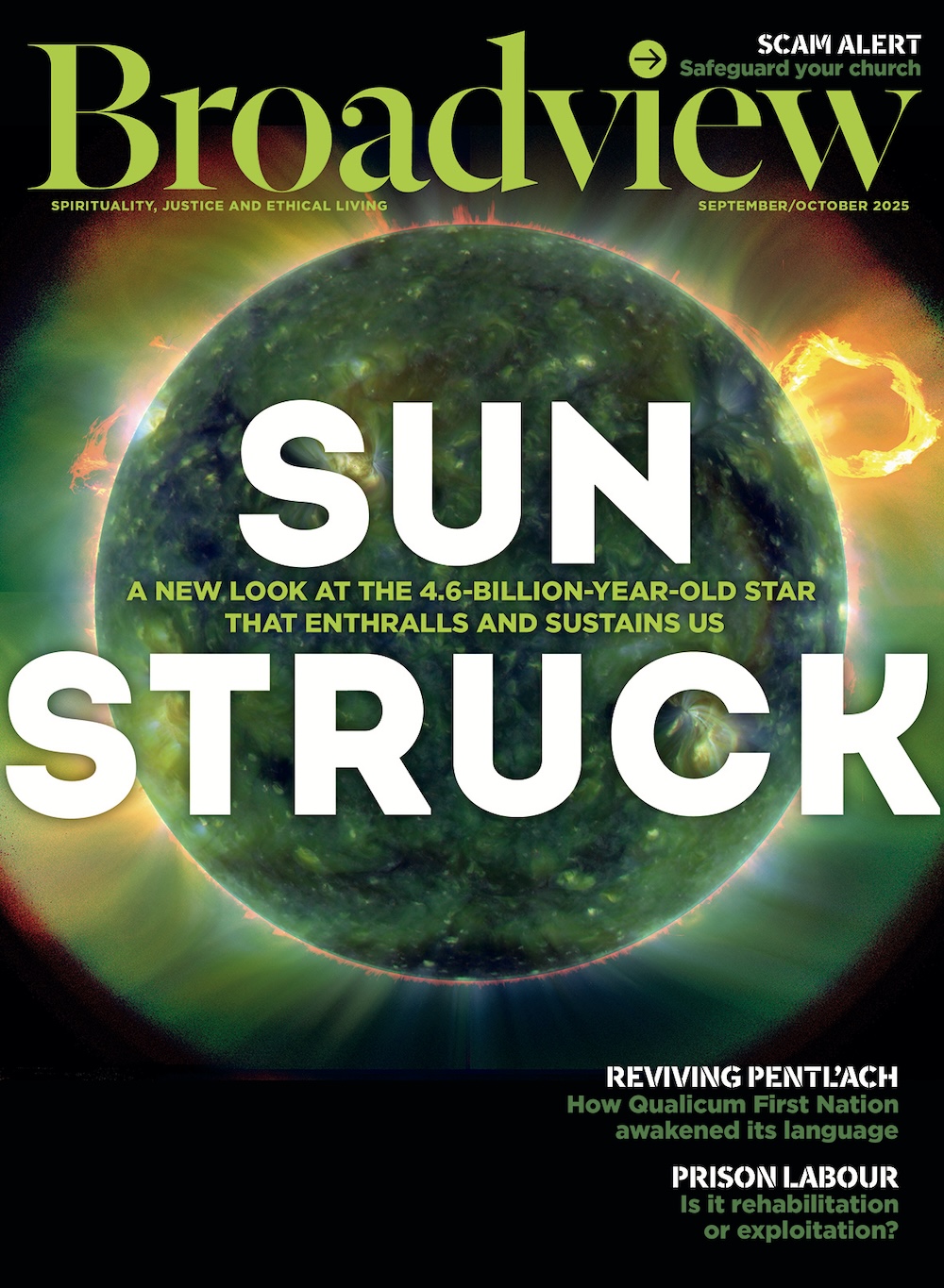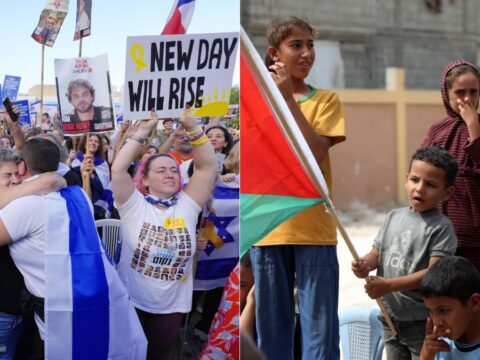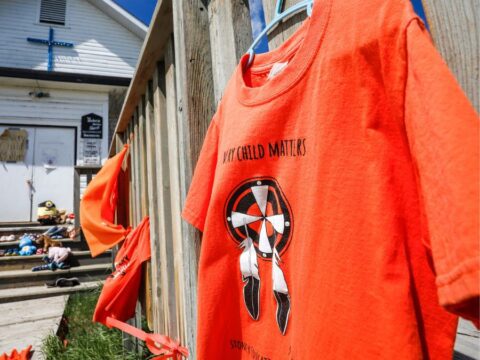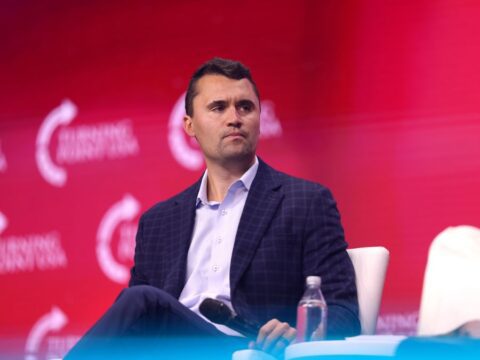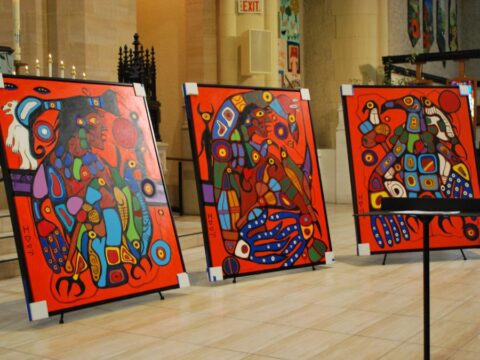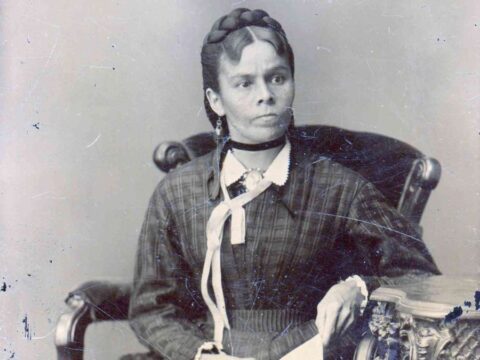The glowing golden domes of the Transfiguration Cathedral stand out against the skyline of Odesa, a regional capital situated along Ukraine’s southern coast and the country’s only remaining access to the Black Sea. Founded in 1795, just a year after the city was established, the cathedral is the most important Eastern Orthodox site in the region and is seen as the heart of the community — even to those who do not consider themselves religious or attend church services.
Locals and visitors appreciated the cathedral’s ornate icons, fresco paintings and candle-lit altars as a highlight of Odesa. It was designated a UNESCO World Heritage site earlier this year.
You may unsubscribe from any of our newsletters at any time.
So when a Russian missile flew through the cathedral’s largest dome in July, setting the main hall on fire and bringing down one of its walls, the entire community mourned the loss.
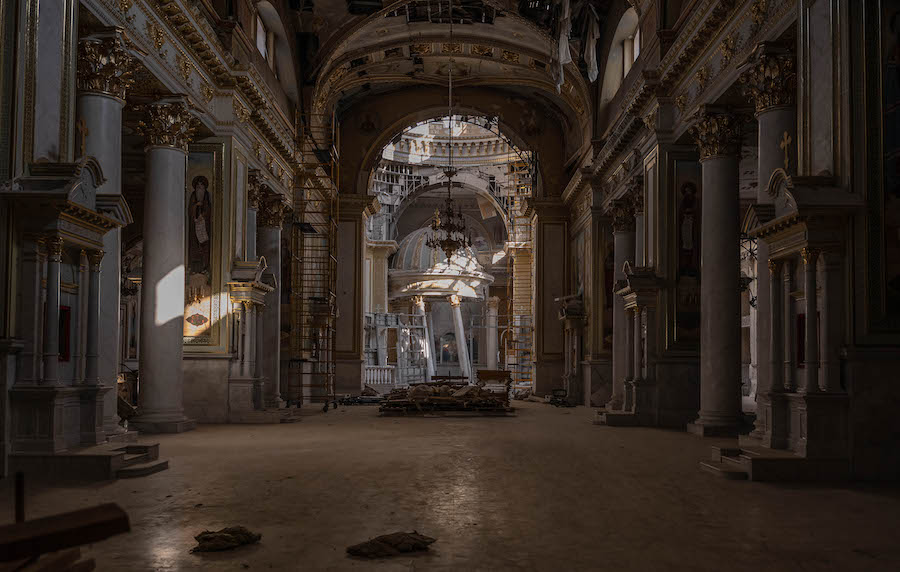
“It felt like a personal grief,” said 27-year-old Vita Perekhodnuyk, an Odesa native who is not religious but said she considers the cathedral an icon. She went to see the destruction for herself the day after the cathedral was bombed, and was unable to tear her eyes away from its smoldering remains.
“The cathedral is the heart and soul of Odesian people,” explained Myroslav Vdodovych, the head priest who worked at the site for over 20 years. “We all felt it.” On July 23, he received an alert on his phone of an incoming missile attack, then quickly learned the cathedral was hit and on fire.
When Vdodovych arrived, his shock momentarily froze him in front of the flames before he ran into the blaze to save as many religious icons as he could from being incinerated along with the great hall.
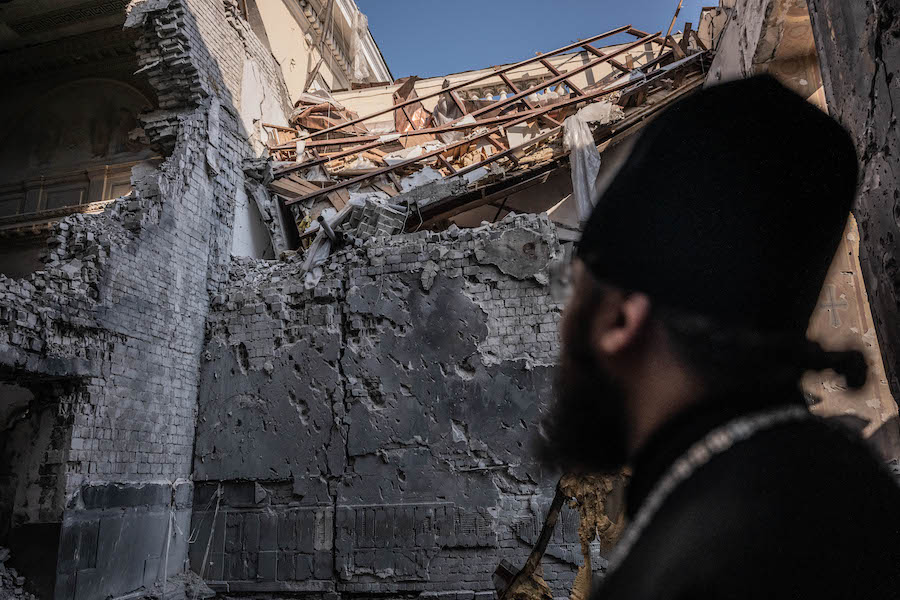
“The fire was only becoming bigger and bigger. [But] I had my aim, a goal, and God helped me to do it. I wasn’t worried that something would happen to me,” Vdodovych said.
Religious ties run deep within the community of Odesa, as does the generational trauma of internal political conflict and international war.
The cathedral was a center point of Orthodox and Odesian life from its founding until it was destroyed by Communist leadership in 1936 as part of their campaign to root out religious worship. It was only reconstructed with public funds by a vote of city residents after the fall of the Soviet Union.
The cathedral was officially consecrated in 2010 by Patriarch Kirill of Moscow — the head of the Russian Orthodox Church and the Ukrainian Orthodox Church (UOC) of the Moscow Patriate, one of the two major Orthodox sects in Ukraine. He publicly announced his support for Russia’s “special mission” in Ukraine and repeatedly refused to condemn the violence or advocate for an end to the bloodshed.
More on Broadview:
- How nuns are helping displaced Ukrainians amid the Russian invasion
- I’m ashamed of what some of my fellow Russians believe about Ukraine
- Lahaina fire burned down historic United Methodist church
The regional leadership of the UOC voted to officially separate from the Moscow Patriarch three months after the beginning of the full-scale invasion, but several believers left the church because of what they saw as old ties that ran deep with the enemy. The Orthodox Church of Ukraine (OCU), the other major Eastern Orthodox body in the country, is under the Kyiv Patriarchate and began distancing itself from Russian leadership in 2018.
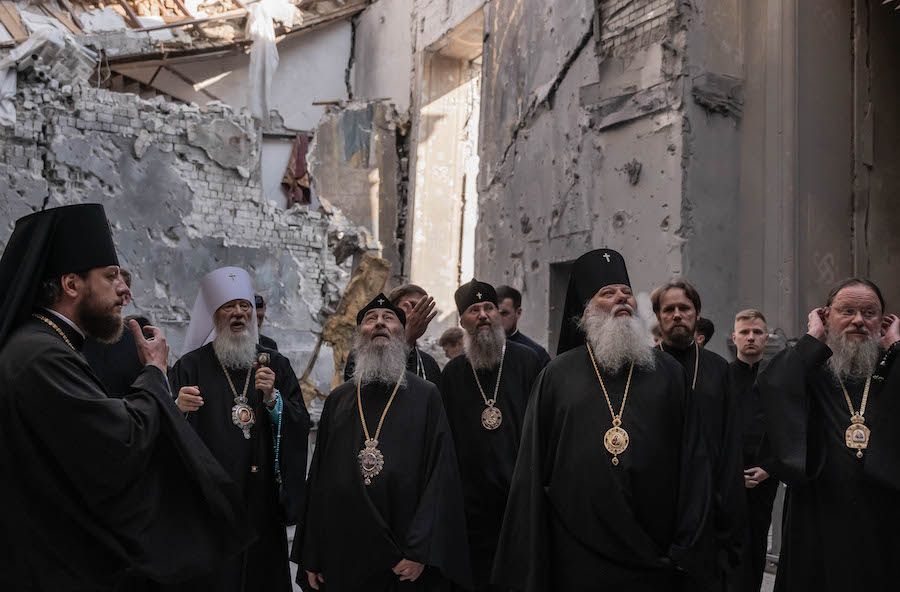
So when the Metropolitan Onufriy of Kyiv, Orest Volodymyrovych Berezovsky, visited the cathedral in late September to tour the destruction and offer his blessings, the community was divided. Unlike his former Patriarch in Moscow, the Onufriy has made public statements supporting Ukrainian statehood and the armed forces since the beginning of the full-scale invasion. He condemns Russian aggression and silence from his Russian peers and calls for an end to the hostilities.
Devout believers sobbed as the revered religious figure crossed his chest and paused to touch the forehead of his devout followers while he picked his way through the rubble of the cathedral’s former grand hall. Mothers asked him to bless their children and protect their families. Veterans bowed to kiss his hand.
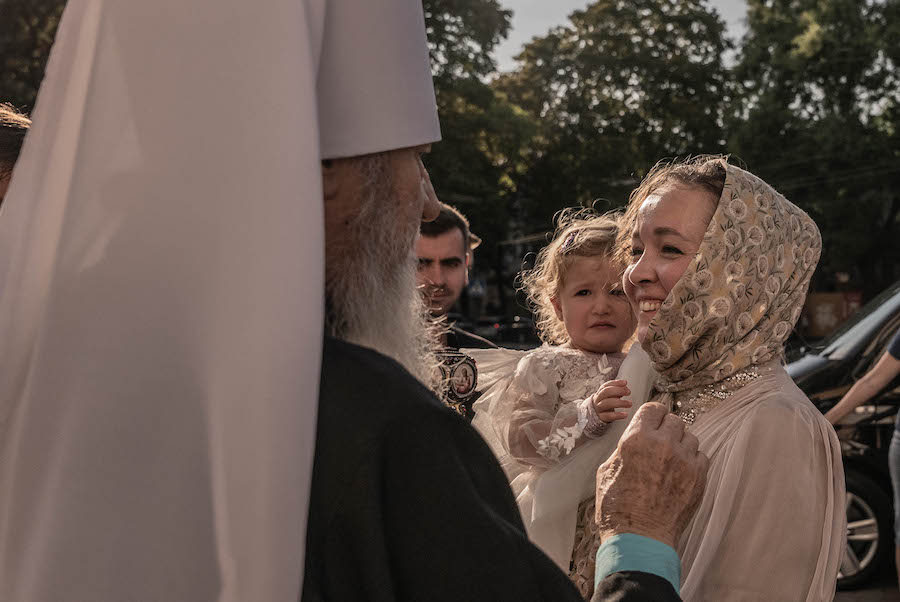
Annual religious celebrations for Easter and Christmas have been affected by the political fallout too. Festivities were either canceled or held in bunkers last year because it was too dangerous to gather in crowds. Lights were forbidden in several cities to save electricity as Russia amped up its attacks on civilian energy infrastructure. While celebrations are less restricted this year — many cities like Odesa and Kyiv have installed dazzling Christmas trees once again — the church has to adapt to another big change.
Most Ukrainian Orthodox Christians, as members of the Russian Orthodox Church, have celebrated Christmas on Jan. 7 for decades according to the Julien calendar, along with countries like Russia, Serbia and Georgia. Ukraine’s President Volodymyr Zelenskyy signed a law moving the official Christmas Day holiday to Dec. 25 to align with the majority of Christian countries and “abandon the Russian heritage,” he explained. This is the first year that Christmas will officially be held on Dec. 25.
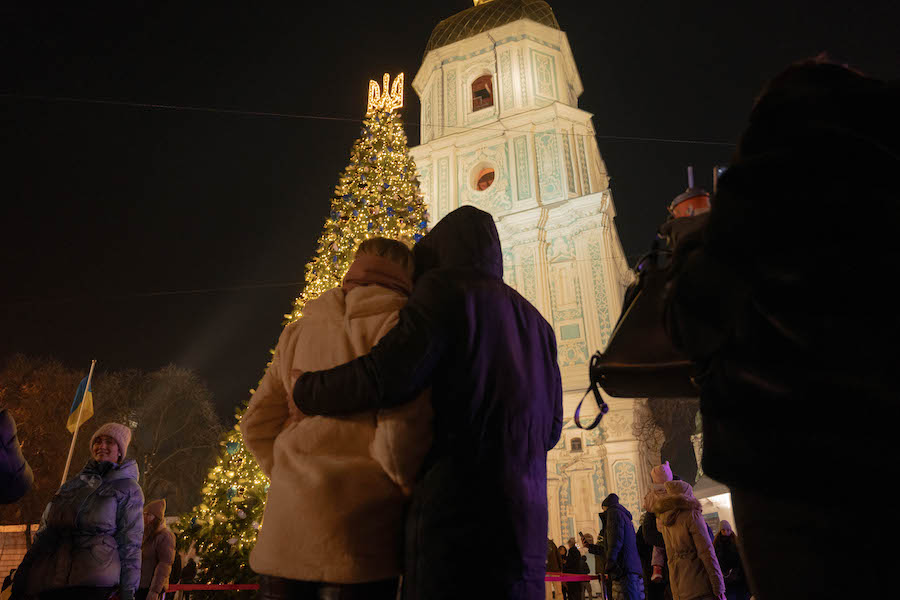
But for some leaders in the Orthodox Church, the government should have no say about the religious calendar and is overstepping its charter by seeking to regulate it.
“Church must be separated and not interfered with by politics. Politics is dirt,” Vdodovych said. The Transfiguration Cathedral plans to hold its annual Christmas services on Jan. 7 as it always has. Vdodovych welcomes believers who choose to celebrate on Dec. 25 to come to the cathedral.
He had one piece of advice for government officials:
“People who are in politics must always remember that there is God. And they will not only answer to their voters.”
***
Katie Livingstone is a freelance journalist based in Ukraine. Completing her master’s degree at the Medill School of Journalism at Northwestern University in 2021, she moved to cover the war after Russia’s invasion.
Svet Jacqueline is an American photographer based in Kyiv, Ukraine.



